

A Global Village - Harvesting Water for Tanzania. Issue 4 » Engineering Development Timothy Thang, Mechanical Engineering, Imperial College London Tanzania experiences a dry season of up to 8 months during which time there is little to no rainfall.
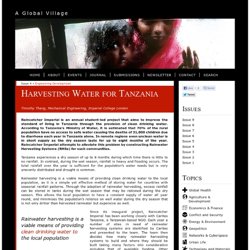
In contrast, during the wet season, rainfall is heavy and flooding occurs. The total rainfall over the year is sufficient for the population’s water needs but is very unevenly distributed and drought is common. Rainwater harvesting is a viable means of providing clean drinking water to the local population, as it is a simple yet effective method of storing water for countries with seasonal rainfall patterns.
Rainwater harvesting is a viable means of providing clean drinking water to the local population Since its inaugural project, Raincatcher Imperial has been working closely with Caritas Tanzania, a Tanzanian-based NGO. {*style:<b>Capturing the Rain When the first rains fall after the dry season, the rainwater is allowed to first run off the roof but not into the tank. Asante: Our Work: East Africa - The Need. “With Education as the foundation, all other dreams can be achieved.” - Madam Yohana Mcha Our comprehensive approach targets the root causes of why children are not attending school or are underachieving when they are in school.
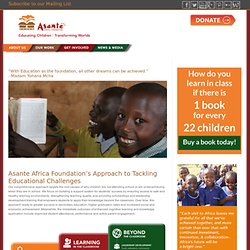
We focus on building a support system for students’ success by ensuring access to safe and healthy learning environments, strengthening teaching quality, and providing scholarships and leadership development training that empowers students to apply their knowledge beyond the classroom. Over time, this approach leads to greater success in secondary education, higher graduation rates and increased social and economic achievement. Meanwhile, the immediate outcomes of enhanced cognitive learning and knowledge application include improved student attendance, performance and active parent engagement.
Help make our work possible. One of the world's leading poverty charities. Women at a savings and loan scheme meeting in Tanzania. © CARE / Nicky Lewin.
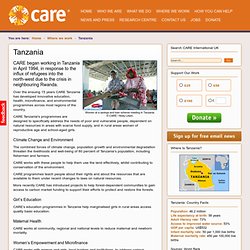
CARE began working in Tanzania in April 1994, in response to the influx of refugees into the north-west due to the crisis in neighbouring Rwanda. Over the ensuing 15 years CARE Tanzania has developed innovative education, health, microfinance, and environmental programmes across most regions of the country. CARE Tanzania's programmes are designed to specifically address the needs of poor and vulnerable people, dependent on natural resources in areas with scarce food supply, and in rural areas women of reproductive age and school-aged girls. Climate Change and Environment The combined forces of climate change, population growth and environmental degradation threaten the livelihoods and well-being of 80 percent of Tanzania’s population, including fishermen and farmers.
CARE works with these people to help them use the land effectively, whilst contributing to conservation of the environment. Creating Change in Communities and NGOs in Tanzania Permaculture Information, News, Forums, Courses. During June this year Tanzania hosted its second ever permaculture design course.
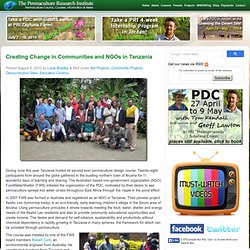
Twenty-eight participants from around the globe gathered in the bustling northern town of Arusha for 11 wonderful days of learning and sharing. The Australian based non-government organization (NGO) FoodWaterShelter (FWS) initiated the organization of the PDC, motivated by their desire to see permaculture spread into wider circles throughout East Africa through the ‘ripple in the pond effect’. In 2007 FWS was formed in Australia and registered as an NGO in Tanzania. Their pioneer project Kesho Leo (tomorrow today) is an eco-friendly, early learning children’s village in the Sinoni area of Arusha.
Using permaculture principles it strives towards meeting the food, water, shelter and energy needs of the Kesho Leo residents and also to provide community educational opportunities and create income. The course was initiated by one of the FWS board members Robert Cork; an environmental engineer from Australia. Depot.gdnet.org/cms/grp/general/Tanzania 42.pdf. Charity: Friends of Tanzania (FOT)- About Us, Welcome. Karibu sana to the Friends of Tanzania (FOT) website.
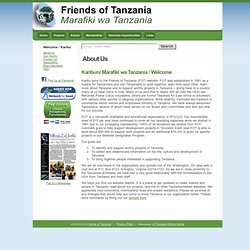
FOT was established in 1991 as a means for Tanzanians and non-Tanzanians to work together, learn from each other, learn more about Tanzania and to support worthy projects in Tanzania -- giving back to a country many of us have come to love. Many of us (and that is nearly 400 all over the USA) are Returned Peace Corps Volunteers; others are former Teachers for East Africa or volunteers with various other secular or religious organizations. More recently, members are travelers or commercial sector visitors and employees formerly in Tanzania. We have always welcomed Tanzanians, several of whom have served on our Board and Committees and who are vital for our success. FOT is a non-profit charitable and educational organization, a 501(c)(3). Our goals are: We are all volunteers in the organization and operate out of the Washington, DC area with a mail box at P.O.
We hope you find our website helpful.